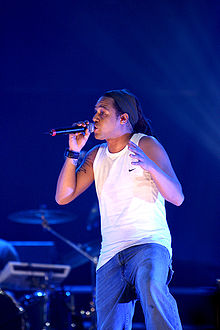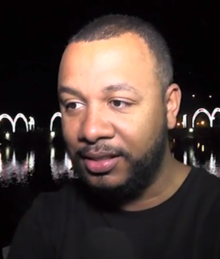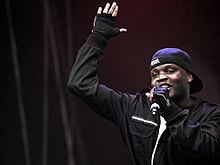Portuguese hip hop
Portuguese hip hop refers to the hip hop subculture in Portugal . In contrast to international hip-hop, Portuguese hip-hop is often referred to as hip-hop tuga , even within the scene. The focus is on the greater Lisbon area and the greater Porto area .
Of the four basic elements of hip-hop, rap , DJing and graffiti are also known in the cultural mainstream in Portugal , while breakdance is mainly lived within the scene. In Portugal, too, the four basic elements have developed into scenes of their own. The best known internationally is the graffiti art of Portugal, especially as part of street art in the capital Lisbon and other cities. But DJs such as Rui da Silva or DJ Vibe have now also gained fame beyond national borders.
Hip hop in Portugal is influenced not only by the international hip hop scene, but also by African influences from the former Portuguese colonies . There are also connections to the Brazilian hip-hop scene .
history

Hip-hop culture, which emerged in New York in the 1970s, also found its way into Portugal from around 1984, when breakdancing became popular here via American films.
Hip-hop developed slowly in Portugal until the late 1980s, only to have grown rapidly since the early 1990s. A scene developed particularly in the suburbs of the capital Lisbon, for example on the Margem Sul do Tejo or the poorer quarters in and around Amadora . Young people from the immigrant communities of the Portuguese-speaking countries in Africa were an important factor. The pioneers included the B.Boys Boxers and the Black Company , both from Almada .
With the release of the CD “Rapública” in 1994, a sampler with the most important MCs and DJs of the time , the scene finally gained wide visibility. The radio station Antena 3 also played a role , the 1994 newly founded youth station of the public radio station RDP , which also frequently played hip-hop, both in the daily program and in the pioneering rap show "Repto".
The Californian musician Ithaka Darin Pappas was also part of the Portuguese hip-hop scene. He released a number of albums before returning to California in 1998.
In the 2000s, the “Nação Hip-Hop” CD sampler series (EMI / NorteSul) ensured that hip-hop tuga remained visible with an annual edition.
The most commercially successful name was the Da Weasel formation , but rappers such as Boss AC , Sam The Kid , General D and Valete also gained some fame.
Groups like Orelha Negra , Expensive Soul or the internationally known Buraka Som Sistema and Cool Hipnoise have their roots in or are connected to the Portuguese hip-hop scene.
There are also connections to the Portuguese reggae scene .
music
Some of the best-known names of Portuguese rapeseed include:
- Black Company
- Boss AC
- Chullage
- Da Weasel
- Dealema
- General D
- Kapataz
- Líderes da Nova Mensagem
- Luaty Beirão
- Mind there gap
- Mundo Secreto
- NBC
- NGA
- Nigga poison
- Sagas
- Sam the Kid
- Sir Scratch
- SP & Wilson
- Valete
- Xeg
literature
- António Concorda Contador, Emanuel Lemos Ferreira: Ritmo & Poesia - Os Caminhos do Rap. Assírio & Alvim, Lisbon 1997 ( ISBN 972-37-0445-5 )
- Salwa Castelo-Branco: Enciclopédia da Música em Portugal no Século XX, C – L Temas & Debates, Lisbon 2010, ISBN 978-989-644098-5 (Chapter Hip Hop , S618ff.)
Videography
- Toxic.TV Hip Hop Reporters (2006, also DVD) - In this French hip-hop report series, the former Saïan Supa Crew -Rapper Specta visits Portugal, whereby, in addition to a trip to Porto, primarily the growing scene in the greater Lisbon area is presented ( Graffiti, rap, breakdance).
Web links
- www.hiphoptuga.org , website about the Hip Hop Tuga
- Hip Hop Tuga - video channel on YouTube
Individual evidence
- ↑ a b c Salwa Castelo-Branco: Enciclopédia da Música em Portugal no Século XX, C – L Temas & Debates, Lisbon 2010 ( ISBN 978-989-644098-5 ), p. 619ff.


